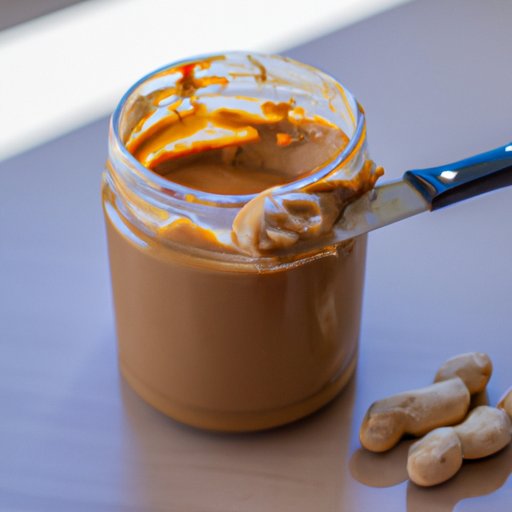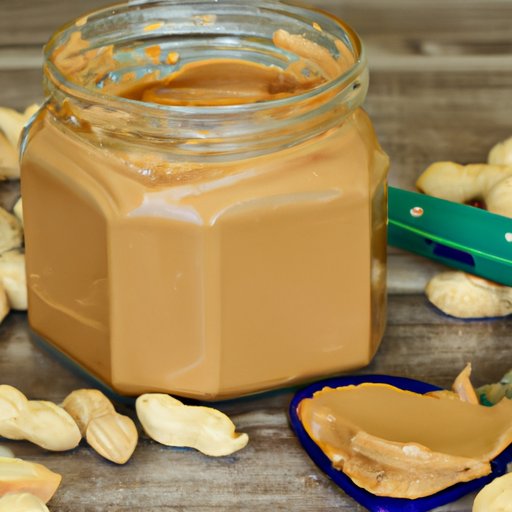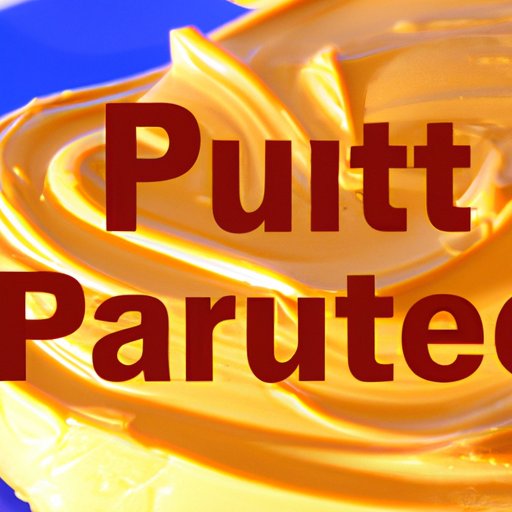Introduction
Peanut butter has long been a beloved staple in many households across the world. Whether it’s spread on toast or mixed into smoothies, this creamy treat is an easy way to add flavor and texture to almost any dish. But is eating peanut butter healthy? This article takes an in-depth look at the nutritional content of peanut butter, as well as potential health risks associated with eating it.

Exploring the Nutritional Benefits of Peanut Butter
When it comes to nutrition, peanut butter has a lot to offer. It contains a variety of vitamins and minerals, including magnesium, phosphorus, zinc, thiamin, and vitamin B6. It also offers a good source of fiber and healthy fats. In addition to these important nutrients, peanut butter is also a good source of plant-based protein.
In terms of calorie content, one tablespoon of peanut butter contains about 94 calories. While this may seem like a lot, it’s important to remember that peanut butter is a concentrated source of energy and should be consumed in moderation. The same goes for its protein content, which comes in at around four grams per tablespoon.

A Closer Look at the Health Risks of Eating Peanut Butter
While there are some nutritional benefits to eating peanut butter, there are also potential health risks associated with it. The most significant risk is the possibility of an allergic reaction. Peanuts are one of the most common food allergens, and consuming even a small amount can trigger a serious reaction in some people. For those with peanut allergies, it’s important to avoid peanut butter altogether.
Another potential health risk is the presence of trans fats. Trans fats are unhealthy fats that have been linked to an increased risk of heart disease and other chronic illnesses. While not all peanut butters contain trans fats, it’s important to read the label to make sure you’re buying a product that is free of them.
Finally, it’s important to note that many brands of peanut butter contain high levels of sodium. Too much sodium can lead to high blood pressure, stroke, and other serious health problems. If you’re watching your sodium intake, it’s best to choose a low-sodium peanut butter or opt for an unsalted version.
Uncovering the Facts: Is Peanut Butter Good for You?
When it comes to deciding if peanut butter is healthy, it’s important to weigh the pros and cons. On the plus side, peanut butter is a great source of protein, vitamins, minerals, and healthy fats. It’s also relatively low in calories and can be enjoyed in moderation. On the downside, it can contain trans fats and may pose a risk for those with peanut allergies.

Peanut Butter: The Pros and Cons of This Popular Spread
Pros:
- Good source of protein, vitamins, minerals, and healthy fats
- Low in calories and can be enjoyed in moderation
- Easy to find and relatively inexpensive
- Versatile ingredient that can be used in a variety of recipes
Cons:
- May contain trans fats
- High in sodium in some brands
- Potential risk for those with peanut allergies
What the Experts Say About Peanut Butter’s Health Benefits
When it comes to the health benefits of peanut butter, experts have differing opinions. Some argue that the combination of protein, fat, and fiber makes it a nutritious snack option. Others believe that the high calorie content and potential for an allergic reaction outweigh any potential benefits. Ultimately, it’s up to each individual to decide what works best for their body and lifestyle.
The American Heart Association recommends limiting peanut butter consumption to two tablespoons per day. They also suggest choosing a brand that is low in sodium and free of trans fats. Additionally, they recommend avoiding products that contain added sugar or hydrogenated oils.
Debunking Common Myths About Peanut Butter and Health
Myth 1: Peanut butter is fattening. While peanut butter does have a higher calorie content than some other foods, it can still be enjoyed in moderation. As long as it’s part of a balanced diet, peanut butter can actually help to support weight loss goals.
Myth 2: Peanut butter causes acne. There is no scientific evidence to support this claim. In fact, studies show that diets high in monounsaturated fats, such as those found in peanut butter, can actually help to reduce acne breakouts.
Myth 3: Eating peanut butter will increase cholesterol levels. Peanut butter does contain saturated fat, which can raise cholesterol levels. However, research shows that the type of fats found in peanut butter are more likely to lower cholesterol levels than raise them.
Conclusion
Overall, peanut butter is a nutritious and tasty snack option that can be enjoyed in moderation. It is a great source of protein, vitamins, minerals, and healthy fats. However, it is important to be mindful of potential health risks, such as allergies and the presence of trans fats and sodium. By reading labels and following the recommendations of the American Heart Association, you can make sure that you’re making the healthiest choice for your body.
In conclusion, eating peanut butter can be healthy when consumed in moderation and as part of a balanced diet. It is important to be aware of potential health risks, such as allergies, trans fats, and sodium, but overall, peanut butter can be a nutritious and enjoyable snack.
(Note: Is this article not meeting your expectations? Do you have knowledge or insights to share? Unlock new opportunities and expand your reach by joining our authors team. Click Registration to join us and share your expertise with our readers.)
